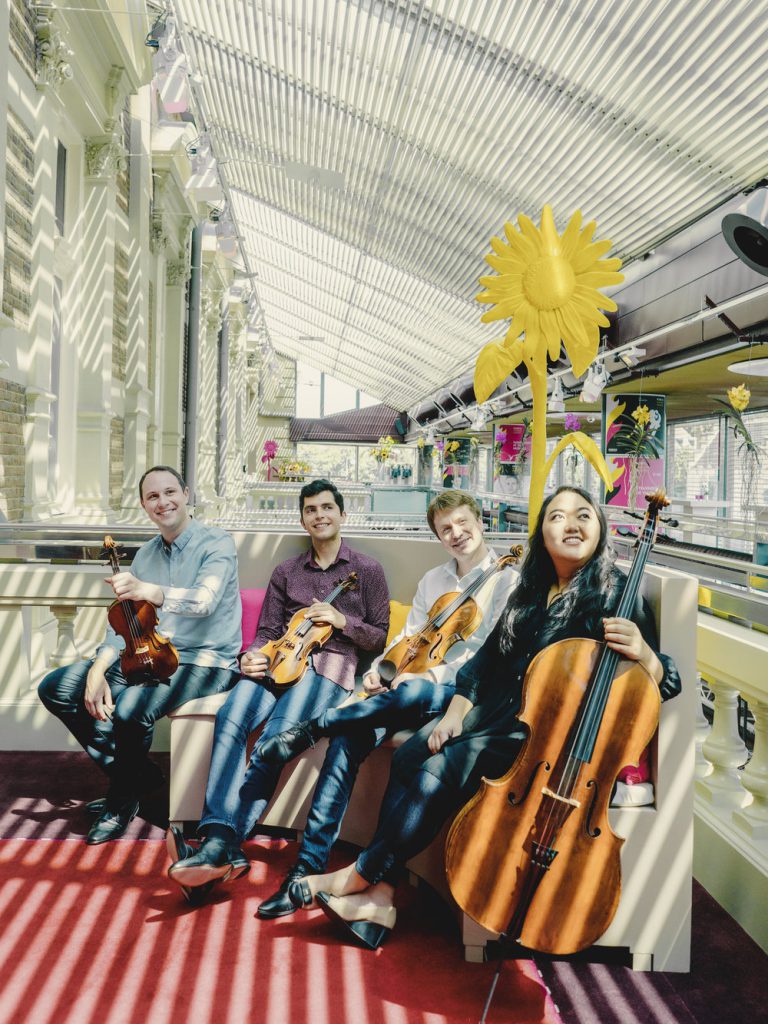Calidore Quartet illuminates historic Viennese program at Wolf Trap

The Calidore String Quartet performed Sunday at Wolf Trap. Photo: Marco Borggreve
Violinist Ignaz Schuppanzigh led what is considered the world’s first public chamber music series in Vienna. Continuing Wu Han’s theme for the season at Wolf Trap devoted to that musical city, the Calidore Quartet made their debut at the Barns Sunday, reproducing a concert given by Schuppanzigh and his string quartet on March 26, 1827, the day that Beethoven died.
As in their Kennedy Center debut last year, the quartet’s Haydn was exceptional, with the clean, warm first violin of Jeffrey Meyers leading the way in the String Quartet in G Major, Op. 77, no. 1. The opening unison theme of the second movement was balanced and united, with vibrato minimized. The aching sequences in this slow movement were rarefied rather than overcooked.
The Menuetto was daring and fast, but not so much so that the Finale, also marked Presto, did not sound even more rapid and light. Infused with humor, but more curled lip than boisterous guffaw, the piece percolated to its end with almost no detail out of place. This was Haydn to be savored, and one hopes that this group records more Haydn quartets soon.
In the middle of the program was an extraordinary performance of Mozart’s String Quartet No. 21, from the “Prussian” set of quartets. Cellist Estelle Choi responded to the first violinist’s questioning melody with gorgeous tone in the first movement, as did violist Jeremy Berry in the second theme. The group struck just the right slightly relaxed tempos in this piece, in which three of the four movements are marked Allegretto.
All four musicians melted in and out of each other’s lines in the pensive second movement, led by Choi’s ardent cello in the second section. She again came to the fore in the Trio section of the Menuetto, introducing little rhythmic hesitations that added a mischievous character. Mozart gave the theme of the Finale first to the viola and cello alone, switching on each return of the theme to different pairings of instruments, giving the group a chance to show off each facet of their collective musicianship.
Schuppanzigh’s concert in 1827 ended with Beethoven’s Piano Trio in G Major, Op. 1, no. 2. It is an early work, published in 1795, and filled with enthusiasm. Scholars have estimated that Beethoven actually died at his home while Schuppanzigh and his colleagues were performing the slow movement of this piano trio.
Second violinist Ryan Meehan had a chance to shine in this performance, joined by Choi and Finnish pianist Juho Pohjonen. While Meehan and Choi produced their accustomed range of tone and volume, Pohjonen tended toward too much sound on the crushing sforzandi so favored by the young Beethoven. At the same time the pianist gave perfect polish to the delicate fingerwork of his right hand in the many flowing roulades of the keyboard part.
The fast portion of the first movement was fast indeed, perhaps tipped too much so by the more nervy approach of Pohjonen. When the performers allowed a slight relaxation in the coda, the ensemble unity of the piece popped into place. The elegant second movement, where Beethoven shows his Mozartean side, was gorgeous, especially the delicate conclusion, another place where the string players brought the overall dynamic and tempo pacing down to the right level.
Pohjonen impressed technically throughout, including the playful Scherzo, the sixteenth-note runs a blur and with intensely sustained trills in the Trio. He was at his best in the madcap antics of the Finale, a rollicking Presto taken at a breathless pace. One moment of uncertainty near the end was quickly righted. The main theme of this zany last movement, with repeated notes that launch upward, could have inspired Rossini when he wrote a similar theme for the “March of the Swiss Soldiers” in William Tell.
Pianists Wu Han, Gloria Chien, and Gilles Vonsattel perform music for four hands by Mozart, Schubert, Mendelssohn, Debussy, and Stravinsky 7:30 p.m. April 26. wolftrap.org; 703-255-1900



